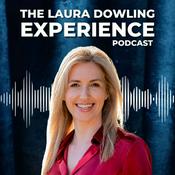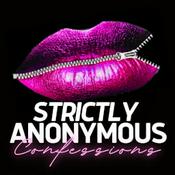58 episodes

Episode 57: Replay: Boundaries and Narcissistic Parents with Terri Cole
11/7/2025 | 52 mins.
Some people will resist your boundaries. That doesn’t mean you’re doing it wrong. In this replay episode, I sit down with psychotherapist and Boundary Boss author Terri Cole for a conversation that so many of you have been asking for: how to set boundaries with a narcissistic parent. Terri doesn’t sugarcoat it. She names what’s hard, calls out the behaviors you might be normalizing, and gives you language and frameworks that actually work, even when you’re dealing with someone who refuses to respect your limits. We talk about her “three boundary offenders” framework (first-timers, repeat offenders, and destroyers), how to enforce boundaries without being rigid or resentful, and why narcissists in particular see your limits as a threat to their control. If you’ve ever had someone use guilt, emotional blackmail, or even faux-concern (“are you okay? you seem unstable…”) to manipulate you into staying small, this conversation is for you. We also talk about the long-term impact of growing up with a narcissistic parent—including codependency, emotional triggers that don’t match the moment, and why so many adult children end up feeling deeply unknown in their closest relationships. If you’re ready to shift the dynamic and protect your peace without losing yourself in the process, this episode is a powerful place to start. There’s nothing wrong with you, and it’s not too late to make a change. Episode Breakdown 00:00 Introduction 02:08 What Healthy Boundaries Actually Are 05:03 Why Boundaries Fail Without Enforcement 08:24 The Three Types of Boundary Offenders 19:02 Why Narcissists React Differently to Boundaries 21:22 Common Manipulation Tactics Narcissists Use 33:15 How Narcissistic Parents Impact Adult Relationships 41:02 Signs You Were Raised by a Narcissistic Parent 47:12 Gaslighting, Triangulation, and Emotional Violations Links Connect with Terri Cole: terricole.com/workshop terricole.com/fatherwound https://boundarybossbook.com/ https://www.instagram.com/terricole/ Connect with Dr. Jaime Zuckerman: https://www.drjaimezuckerman.com/ https://www.zgrouptherapy.com/ https://www.instagram.com/dr.z_psychologist/ https://www.tiktok.com/@dr.z_psychologist https://www.youtube.com/@DrJaimeZuckerman Get my FREE breathing exercise here: http://www.drjaimezuckerman.com/newsletter Register for my on demand virtual courses here: http://www.drjaimezuckerman.com/workshops Order my workbooks! *Find Your Calm / Find Good Habits* http://www.drjaimezuckerman.com/books Shop my new Mindfully Messy hoodie here: http://www.drjaimezuckerman.com/apparel Podcast production and show notes provided by HiveCast.fm

Episode 56: Trauma and The Fawning Response with Dr. Ingrid Clayton
04/7/2025 | 43 mins.
Fawning isn’t a flaw to fix. It is a brilliant survival response that can quietly shape your entire identity until you finally have the words for it. In this episode, I sit down with clinical psychologist and author Ingrid Clayton for a conversation that I know will resonate deeply with so many of you. We talk about fawning, what it is, how it shows up, and why it’s so often misunderstood. If you’ve ever felt like you disappeared in a relationship or lost touch with your own needs just to keep someone else happy, you’re not alone. And chances are, your nervous system was doing exactly what it needed to do to keep you safe. Ingrid shares her own story as a survivor of complex trauma, and how that experience shaped the work she does now. We explore the difference between trauma that’s tied to a single event and the kind that builds over time in ways that can be hard to name. We talk about what healing actually looks like, how to start reconnecting with yourself, how to recognize the patterns that no longer serve you, and how to hold space for the grief that sometimes comes with change. This isn’t a conversation filled with quick fixes or five-step plans. It’s honest and validating. If you’ve ever asked yourself, “Why do I keep doing this?” or “What’s wrong with me?” I hope this episode helps you see that nothing about you is broken. There’s a reason for the patterns. And there’s also a way through. Episode Breakdown: 00:00 Introduction 02:08 How Personal Experience with Trauma Shaped Dr. Ingrid Clayton’s Work 03:17 What Complex Trauma Really Looks Like 10:20 Fawning as a Smart and Adaptive Trauma Response 14:03 Why Codependency and People-Pleasing Miss the Point 20:20 Real-Life Examples of Fawning in Adulthood 27:20 Why Trauma-Informed Therapy Matters 30:10 Rebuilding a Relationship with Yourself 36:09 How Healing Can Change Your Closest Relationships 40:41 Dr. Clayton’s Message to Anyone Who Feels Broken Links Book: Believing Me https://amzn.to/4lkulGy Website: https://www.ingridclayton.com/ Preorder ‘Fawning’ here: https://www.penguinrandomhouse.com/books/779579/fawning-by-dr-ingrid-clayton/ https://www.instagram.com/ingridclaytonphd/ Connect with Dr. Z: https://www.drjaimezuckerman.com/ https://www.zgrouptherapy.com/ https://www.instagram.com/dr.z_psychologist/ https://www.tiktok.com/@dr.z_psychologist https://www.youtube.com/@DrJaimeZuckerman Get my FREE breathing exercise here: http://www.drjaimezuckerman.com/newsletter Register for my on demand virtual courses here: http://www.drjaimezuckerman.com/workshops Order my workbooks! *Find Your Calm / Find Good Habits* http://www.drjaimezuckerman.com/books Shop my new Mindfully Messy hoodie here: http://www.drjaimezuckerman.com/apparel Podcast production and show notes provided by HiveCast.fm

Episode 55: On Love and Relationships with Jillian Tureck
20/6/2025 | 42 mins.
Most people don’t realize how much of their relationship pain comes from patterns they never chose and beliefs they never questioned, and I’ve seen it over and over again. In this episode, I’m joined by someone I’ve admired for a long time, relationship expert and author Jillian Turecki. Her new book, “It Begins With You: The Nine Hard Truths About Love That Will Change Your Life,” is the kind of work that doesn’t just offer advice. It asks you to look inward. We talk about the ways we lose ourselves in relationships, the lies we tell ourselves to keep people close, and what it really means to grow after heartbreak. What does healthy love even look like? How do we know when we’re giving too much? Why do so many of us feel like we have to convince someone to stay? Jillian shares so much of her insight and experience in this conversation: why deal breakers matter, how our family stories shape our love lives, and what it actually means to make peace with the past. One of the most powerful takeaways for me was her perspective on forgiveness, and how letting go doesn’t always mean condoning someone’s behavior. Sometimes it just means refusing to carry the story anymore. If you’ve ever felt stuck, questioned your worth in a relationship, or wondered why you keep ending up in the same kind of dynamic, this one’s for you. I hope it leaves you feeling seen… and more importantly, ready to take your power back. Episode Breakdown: 00:00 Jillian Turecki and Her Work 03:14 The Importance of Self-Reflection in Relationships 06:00 Defining Healthy Love 08:49 Understanding Deal Breakers in Relationships 11:57 The Complexity of Relationship Dynamics 15:08 The Myth of Fairy Tale Love 18:01 The Challenge of Convincing Someone to Love You 20:59 Processing Breakups and Moving Forward 24:00 Making Peace with Your Parents 36:49 Final Thoughts and Words of Wisdom Links Connect with Jillian Turecki: https://www.jillianturecki.com/book https://www.instagram.com/jillianturecki/?hl=en https://podcasts.apple.com/us/podcast/jillian-on-love/id1640172049 Connect with Dr. Z: https://www.drjaimezuckerman.com/ https://www.zgrouptherapy.com/ https://www.instagram.com/dr.z_psychologist/ https://www.tiktok.com/@dr.z_psychologist https://www.youtube.com/@DrJaimeZuckerman Get my FREE breathing exercise here: http://www.drjaimezuckerman.com/newsletter Register for my on demand virtual courses here: http://www.drjaimezuckerman.com/workshops Order my workbooks! *Find Your Calm / Find Good Habits* http://www.drjaimezuckerman.com/books Shop my new Mindfully Messy hoodie here: http://www.drjaimezuckerman.com/apparel Podcast production and show notes provided by HiveCast.fm

Episode 54: Toxic with Elizabeth Chambers
13/6/2025 | 1h 2 mins.
Toxic relationships don’t usually start with obvious red flags. More often, they start with connection, someone who seems to really see you, who shows up in big ways, who makes you feel chosen. But over time, that connection can shift into something confusing, isolating, and hard to recognize for what it is. I talk with Elizabeth Chambers, Host, Investigative Journalist and Executive Producer of the docuseries “Toxic,” about the psychological patterns behind abusive relationships - how they take shape, why they’re so easy to miss, and what keeps people from leaving. Elizabeth shares the stories of survivors she interviewed, many of whom came from loving, stable homes and never expected to end up in something harmful. We also get into how culture plays a role. The fairytales we grow up with, the rom-com tropes, the magazines that taught us how to “get the guy” - they all send messages that can make it easier for abusers to gain trust and control. And when someone starts tailoring themselves to your vulnerabilities, mirroring your interests, slowly taking over the parts of your life that matter most, it rarely looks like abuse in the moment. I talk through the tools I see used again and again in narcissistic relationships - love bombing, gaslighting, financial control - and how easy it is for good, smart people to get caught in them. And we explore what real support looks like when someone you care about is stuck in a relationship that’s hurting them. This episode is a reminder to pay attention. To stay curious. To talk about the things we’re taught to keep private. Because awareness is the first step, and no one should have to figure it out alone. Episode Breakdown: 00:00 Introduction to Narcissism and Healing 02:52 The Impact of Toxic Relationships 05:53 Recognizing Generational and Cultural Patterns 11:57 Why It’s So Hard to Leave 18:09 Love Bombing and Emotional Control 24:06 Red Flags and Manipulation Tactics 30:06 The Psychology Behind Abuse 34:25 Power, Intimacy, and Control 41:07 Communication and Relationship Imbalances 49:49 How Friends and Family Can Help 51:32 Breaking the Cycle for Future Generations Links Watch Toxic on Max: https://www.max.com/shows/toxic/33977981-2e30-45d2-98c6-3145f9c40b33 https://www.instagram.com/elizabethchambers/ Connect with Dr. Z: https://www.drjaimezuckerman.com/ https://www.zgrouptherapy.com/ https://www.instagram.com/dr.z_psychologist/ https://www.tiktok.com/@dr.z_psychologist https://www.youtube.com/@DrJaimeZuckerman Get my FREE breathing exercise here: http://www.drjaimezuckerman.com/newsletter Register for my on demand virtual courses here: http://www.drjaimezuckerman.com/workshops Order my workbooks! *Find Your Calm / Find Good Habits* http://www.drjaimezuckerman.com/books Shop my new Mindfully Messy hoodie here: http://www.drjaimezuckerman.com/apparel Podcast production and show notes provided by HiveCast.fm

Episode 53: Couples Therapy with a Narcissist? Think Twice
23/5/2025 | 34 mins.
Couples therapy isn’t always a safe space, especially when a narcissist is in the room. I get asked about this constantly: “Should we try couples therapy?” If your partner has narcissistic traits or narcissistic personality disorder, my answer is no. In this episode, I explain why. Too often, therapy turns into a performance, another platform for the narcissist to manipulate, charm the therapist, and flip the narrative. Instead of feeling supported, the person being harmed walks out feeling blamed, invalidated, and more confused than ever. The truth is, most therapists aren’t trained to recognize the subtle patterns of narcissistic abuse. They might know the diagnosis from a textbook, but they miss the gaslighting, coercive control, and emotional manipulation happening right in front of them. I’ve seen how that leads to real harm. If you’ve been to couples therapy and felt like something was off, or worse, felt like the problem, you’re not imagining it. You’re not overreacting. And you’re not alone. In this episode, I break down why I never recommend couples therapy in these situations, and why individual support is not just more effective, but also safer. Episode Breakdown: 00:00 Introduction 01:16 Why Couples Therapy Fails with a Narcissist 03:38 Therapists Often Miss the Signs of Narcissistic Abuse 08:16 How Narcissists Use Therapy as a Stage 10:48 Their Real Agenda Isn’t Healing 12:08 Toxic Behavior vs. Narcissistic Abuse 18:06 Why Speaking the Truth in Therapy Can Be Dangerous 21:08 When Therapy Advice Causes More Harm 24:55 Is There Any Benefit to Couples Therapy? 29:55 Why Individual Therapy Is the Safer Choice 33:00 Dr. Z’s Advice and How to Get Help Links Connect with Dr. Z: https://www.drjaimezuckerman.com/ https://www.zgrouptherapy.com/ https://www.instagram.com/dr.z_psychologist/ https://www.tiktok.com/@dr.z_psychologist https://www.youtube.com/@DrJaimeZuckerman Get my FREE breathing exercise here: http://www.drjaimezuckerman.com/newsletter Register for my on demand virtual courses here: http://www.drjaimezuckerman.com/workshops Order my workbooks! *Find Your Calm / Find Good Habits* http://www.drjaimezuckerman.com/books Shop my new Mindfully Messy hoodie here: http://www.drjaimezuckerman.com/apparel Podcast production and show notes provided by HiveCast.fm
More Health & Wellness podcasts
Trending Health & Wellness podcasts
About Next Up: Narcissism
Listen to Next Up: Narcissism, Are We There Yet ? with Kathryn Thomas and many other podcasts from around the world with the radio.net app

Get the free radio.net app
- Stations and podcasts to bookmark
- Stream via Wi-Fi or Bluetooth
- Supports Carplay & Android Auto
- Many other app features
Get the free radio.net app
- Stations and podcasts to bookmark
- Stream via Wi-Fi or Bluetooth
- Supports Carplay & Android Auto
- Many other app features


Next Up: Narcissism
download the app,
start listening.


































